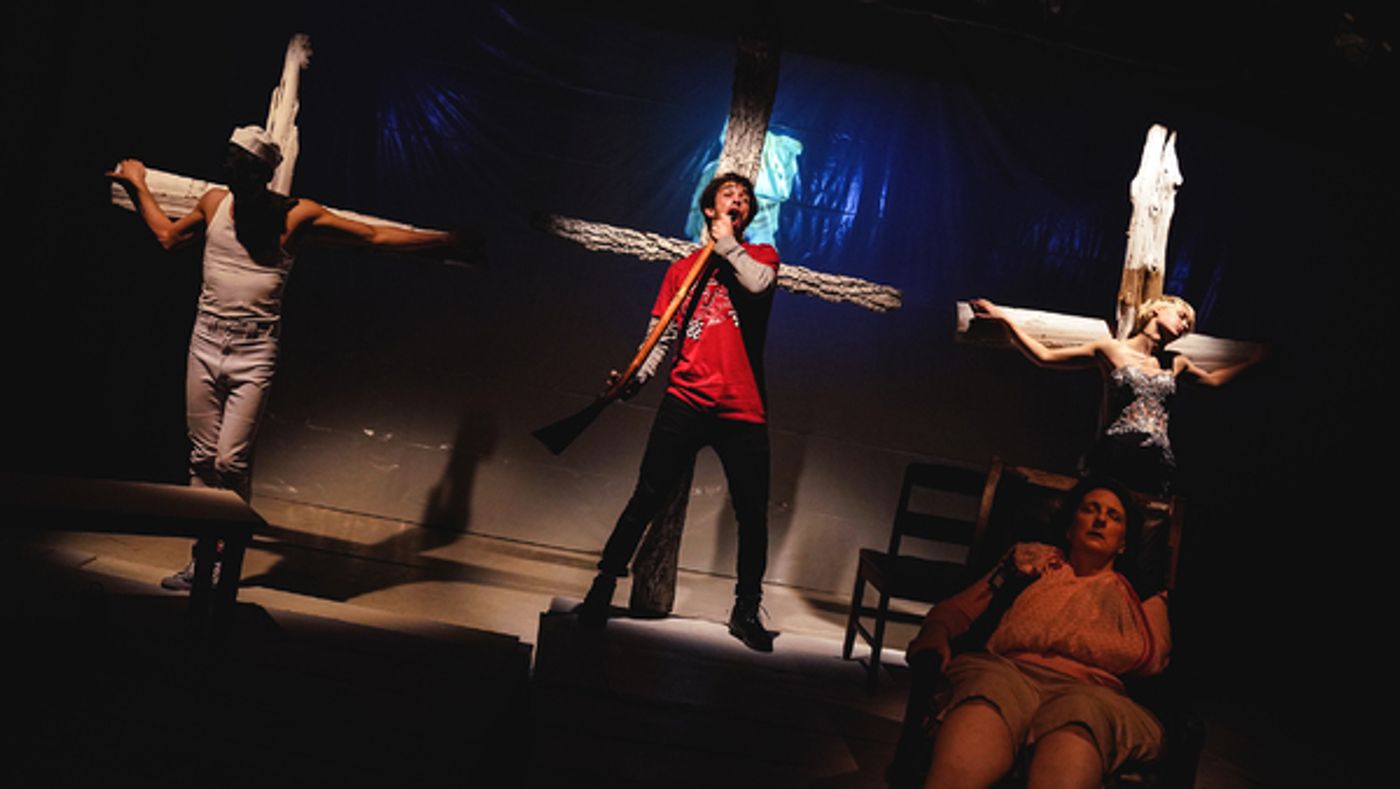Review: THE FAT LADY SINGS Vocalizes the Crumbling Patriarchy and Return of the Divine Feminine

Playwright Jean-Claude van Itallie returned to the home of his Mama - Ellen Stewart, the late founder of the iconic, revolutionary downtown theatre, La Mama Experimental Theatre Club, that is - to deliver an urgent message about the "demonic forces that have brought our country to its knees" with his provocative and poignant new play The Fat Lady Sings. This powerful, engaging piece of theatre is both timely and timeless in its themes. It also marks van Itallie's return to the more searing, urgent, sociological and political in-depth examinations that were prominently featured in his seminal anti-war work, America Hurrah (1966), hailed as a watershed political play of the '60s.
Van Itallie was an important figure in the creative and expressive boom that occurred in the 1960s and 1970s in New York City - the heyday of the downtown arts scene and the birth of Off-Off Broadway, amongst other movements that buzzed around in hives of artistic energy such as Caffe Cino, the Open Theater and La Mama. He was close friends with Allen Ginsberg and a student of Rinpoche Chogyam Trungpa - a renowned Tibetan Buddhist master who co-penned with Francesca Fremantle, the most widely used English translation of what is commonly known as The Tibetan Book of the Dead, an instruction manual from ancient Tibetan scrolls (which van Itallie transformed into a theatrical text). As an educator devoted to sharing techniques he's learned or developed to unleash one's most vital personal expressions, van Itallie and his cohorts teach writing, meditation, healing and a variety of other workshops to ignite creativity at universities, in New York City and his sprawling retreat center buried in the woods in the Berkshires, Massachusetts - Shantigar. Angels in America playwright Tony Kushner is amongst several notables who have attended these intimate and transformative workshops or been touched by Van Itallie's unique methods over the years. "Jean-Claude is the only play-writing teacher I ever had," Kushner proclaimed.
The Fat Lady Sings does honor to the vibrant spirit of the '60s downtown theatre scene where creativity trumped commercialism and no topic was too taboo (rather, the more taboo the better). But when asked about those legendary, dynamic times he lived through and wrote plays during, and how that period does or does not affect his current work, van Itallie reflected, "I write a play because I feel a deep urge to respond to the moment personally and politically, without considering what decade we are currently in. In the '60s we found language and staging that exposed the societal lies we had been told in the '50s. Now again, we are told lies, on a grander scale than ever. Some of the dramatic techniques we used in the '60s are still useful. So are new techniques." At its heart, this new play places a stark spotlight on the ills of today in America and also sheds light on issues that have been ongoing for centuries, even several millennia, making the piece both of the zeitgeist and universal at the same time.
The Fat Lady Sings finds a Tea Party family on a ship, lost at sea, seemingly isolated and swimming in a world of their own delusions The father, mother, daughter and two sons, act out stereotyped roles and expectations as they spout their dialogue in a relentless, rapid-fire newscaster or advertisement style, with kinder moments of genuine connection and love strewn throughout. "Language is paramount in the play, as it is in our lives," van Itallie explained. "How people speak to each other reflects how we breathe and think as a society. Brainwashed by commercial-speak all the livelong day, how can we help but repeat these lies and meaningless phrases to each other as if they meant something? Our own real feelings rarely can find ways to express themselves, and we have lost the art of sharing silence. We speak in rapid-fire half-thoughts, our minds hardly our own." Perhaps the most disturbing and unsettling thing about the piece is its familiarity. These are folks we have seen, known and they may even be our own friends and family. While some of the downtown New York audiences may have felt safe in their "liberal bubble", none of us are completely immune to these abhorrent yet pervasive influences.
The play may be many things and it utilizes a variety of theatrical styles and techniques, but don't dare call it satirical. "I despair that The Fat Lady Sings might be experienced as merely satire," van Itallie expressed, "Satire' is a facile way to dismiss the play, and for the play itself to lay blame on a particular group of people. The Fat Lady Sings is an in-depth look under the surface at the hidden demons in our collective psyche that have brought us to our knees nationally." He continues, "Festering hidden demons are in all of us, to one degree or another, passed on from generation unto generation. Some demons have been around for hundreds of years -- like patriarchy, fundamentalism, slavery, racism, capitalism and the routine mistreatment of children. The governmental and commercial powers harness these secret demons to exploit us."
There is much truth to what van Itallie says, and in the piece, numerous hot topics are brought up and examined: teenage pregnancy and incest, prostitution, misogyny, the military, gun-crazed culture, ambition and disappointment, entitlement, patriarchy, subjugation, and other societal ills. This nuclear family seems to bear the weight of the world, at least, their own world -- trapped in their own tiny universe. In his own words, van Itallie describes the household at sea: "The Fat Lady Sings focuses on one Tea Party family, the father of which reflects the current White House occupant. Sometimes the family speaks to each other in media advertising terms, sometimes in more tender ways. Ultimately the whole patriarchal system reveals itself as a rotten vessel of cruelty and selfishness. But there's hope in unveiling all this...cause it ain't over 'til the fat lady, the great mother herself, sings."
The vessel is steered by Franklin, the father, who represents the power-hungry, violent and pig-headed desperation, greed, egotism and ignorance of the patriarchy. He is portrayed by Tony Torn, whose impressive parentage (actors Rip Torn and Geraldine Page) argues the case that talent may well be genetic. Though he looks like your average American dad - with a beer belly and gentle blue eyes - something truly sinister lurks in his soul and Torn portrays Franklin's dichotomy and diabolical side brilliantly. The kids are Ed (Jake Horowitz), the militant, brainwashed son who wants to honor and emulate his father; Tim (Jose Useche), his flamboyantly gay brother who hustles on the side for extra income he sneaks to their mother; and Mary (Nancy McArthur), the daughter who is caught in the middle of many atrocities and is the apple of her father's eye in a most unfortunate way. All are exceptionally talented performers who showed incredible commitment to their characters and make the text come to vivid life. Rounding out the family is Mom, played by renowned opera singer and actress Lauren Flanigan, who sits on a chair with a broken arm (a token from her husband) throughout most of the piece. She is weary and lethargic, worn out from this world and seen as an afterthought, always encouraging the family to "wash your hands." Mom clearly laments her choices and where this life has led her, but when questioned by her children she merely shrugs, "I had to marry someone. It's what you did." Like so many women of her generation and those before her, she is stuck in a cycle and forced into her situation out of societal expectations and standards.
The real captain of the ship is director David Schweizer who is no stranger to shaping radical, provocative, experimental and highly collaborative productions of new theatre, opera and performance works for four decades. Van Itallie's latest play was in good hands with Schweizer at the helm of the vessel, even when the rocky waters of health concerns caused the playwright to not be able to attend the rehearsals, much to his disappointment. But the mutual trust and strong choices for this collaboration have paid off - the performance was engrossing, powerful and profoundly relevant. It got under your skin and begged viewers to question the world we find ourselves drifting in and consider what we might do to start transforming it into a better place. How might we change our minds and actions to work towards restoring order and balance?
It may have seemed an odd choice to cast an acclaimed opera star in a role that seems initially appeared rather submissive, thankless and demure, but looks and assumptions can be deceiving and misleading. As the old colloquialism often used as a proverb that the title suggests (an opera reference itself) states - it's not over until it's over and when Mom finally does rise up, she casts asunder two millennia of ignorance, control and abuse. She reclaims the power lost to the patriarchal forces and even demands that her three children who have been crucified by their own father, "Climb off those crosses, you've been there for 2,000 years." In this moment she emulated the Divine Mother energy and spirit of Mother Earth - one of healing, love, joy, peace and balance. At the end, Flanigan sings "God Bless America" with her captivating voice in a haunting tone, and the song takes on an entirely new meaning. For me, it felt as if I was hearing it for the first time.
Van Itallie sincerely wishes that future audiences continue to have strong responses to the dramatic ending of The Fat Lady Sings. He desires for the piece to resonate with people living in these troubled times and offer perhaps a glimmer of hope for what could be when the end of the culture of patriarchal control gives way to a gentler, more vital, nurturing and sustainable vision for the world. "I hope the audience is as thrilled as I am to hear the fat lady sing at the end. Throughout the play, the mother, as oppressed as everyone else, has been telling her family to go wash their hands. She is dismissed as women are in this society. Yet she is intuitive. When the patriarchal world reaches its inevitable painful auto-destruction, the mother finally comes into her own - the Divine Feminine, and we hear the thrilling loving sound of what might have been and might still be."

Jake Horowitz, Jose Useche, Nancy McArthur and Lauren Flanigan in Jean Claude van Itallie's THE FAT LADY SINGS directed by David Schweizer at La Mama ETC. Photo by Carlos Cardona.

Tony Torn in Jean Claude van Itallie's THE FAT LADY SINGS directed by David Schweizer at La Mama ETC. Photo by Carlos Cardona.

Jake Horowitz and Jose Useche in Jean Claude van Itallie's THE FAT LADY SINGS directed by David Schweizer at La Mama ETC. Photo by Carlos Cardona.

Nancy McArthur and Tony Torn in Jean Claude van Itallie's THE FAT LADY SINGS directed by David Schweizer at La Mama ETC. Photo by Carlos Cardona.

Jose Useche, Jake Horowitz and Nancy McArthur in Jean Claude van Itallie's THE FAT LADY SINGS directed by David Schweizer at La Mama ETC. Photo by Carlos Cardona.

Lauren Flanigan in the final scene of Jean Claude van Itallie's THE FAT LADY SINGS directed by David Schweizer at La Mama ETC. Photo by Carlos Cardona.
Reader Reviews
Videos

